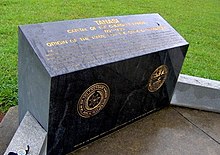Name of Tennessee

The earliest known written variant of the name that became Tennessee was recorded by Spanish explorer Captain Juan Pardo when he and his men passed through a Native American village named "Tanasqui" in 1567 while traveling inland from modern-day South Carolina. In the early 18th century, British traders encountered a Cherokee town named Tanasi (or "Tanase", in syllabary: ᏔᎾᏏ) in present-day Monroe County, Tennessee. The town was on a river of the same name (now known as the Little Tennessee River) and appears on maps as early as 1725. It is not known whether this was the same town as the one Juan Pardo encountered, but recent research suggests that the "Tanasqui" Pardo recorded was at the confluence of the Pigeon River and the French Broad River, near modern Newport, Tennessee.[1]
The precise meaning and origin of the word are still uncertain. Early
The modern spelling, Tennessee, is attributed to
See also
References
- ISBN 9780817351908– via Google Books.
- ISBN 978-0-914875-19-2– via Internet Archive.
- JSTOR 42623257. Retrieved 23 January 2022.
- ^ "Tennessee's Name Dates Back To 1567 Spanish Explorer Captain Juan Pardo". Tngenweb.org. January 1, 2005. Archived from the original on January 3, 2011. Retrieved July 31, 2010.
- ^ Hackett (Woktela), David. "Who Were the Mysterious Yuchi of Tennessee and the Southeast?". Yuchi.org. Retrieved 23 January 2022.
- ISBN 9781577361251– via Internet Archive.
